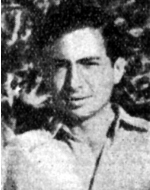Wolf, Mordechai-Shmuel (Muki)
Son of Sarah and Jacob, Mordechai-Shmuel was born on November 9, 1927, in the town of Chof, in eastern Slovakia. In 1944, the entire family was taken to the Auschwitz death camp where his father and mother and his two younger brothers were murdered. Only he and a younger brother survived. In the camp he tried to organize a group of young people to escape, but the attempt was unsuccessful. In return for painting portraits and caricatures of the overseers, he was able to get food for him and his brothers and friends and encouraged them to believe in the future, while trying to absorb scenes from the extermination camp to commemorate them for generations to come. After the liberation he set out on the “escape route” to Italy and in 1946 he immigrated to Israel on the ship “Eliahu Golomb” (“Fida La Spezia”). In Israel, he spent a few months in a training course in Hulata, where he continued to practice painting. Afterward he moved to Haifa. Among other things, he put on the canvas memoirs from the Auschwitz death camp, and one of them was in Yagur. In the winter of 1948 he arrived for service in the Carmeli Brigade and in a letter to his brother asked him to send him his banjo so that he could play in the army and “entertain the members”. On the afternoon of March 27, 1948, a convoy of seven vehicles and 90 people arrived in Nahariya to deliver supplies and reinforcements to Yehiam, and the caravan was ambushed by the Arabs. The first armored vehicle managed to break into Yehiam, but the rest of the vehicles were ambushed. Some of them fell in combat, and Mordechai was among them. He was brought to rest in a mass grave in the military cemetery in Nahariya.
